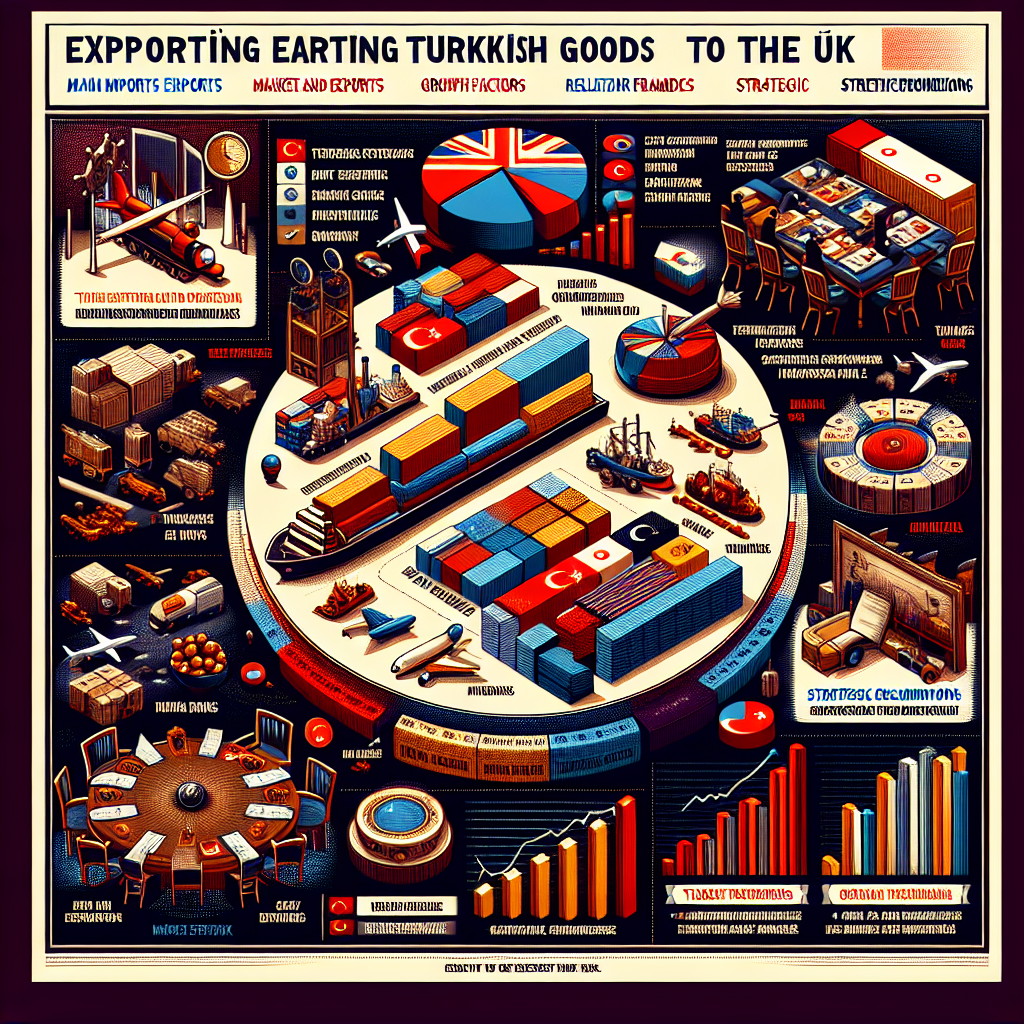“Boosting Turkish Exports to the UK: Trends, Analysis & Strategies”

Exporting Turkish Goods to the UK
Objective
To produce a detailed analytical report on the export activities of Turkish goods to the United Kingdom, utilizing advanced data integration for comprehensive market insights.
Executive Summary
The trade relations between Turkey and the United Kingdom display a robust interaction, particularly in the export segment. Turkish exports to the UK include a variety of goods such as textiles, automotive parts, machinery, and agricultural products. The focus on quality, competitive pricing, and the significant demand for Turkish products in the UK market drive robust trade volumes. Trade trends indicate steady growth, influenced by favorable bilateral trade agreements and compliance with European standards.
Detailed Analysis
Section A: Import Analysis for the UK
- Main Imported Products: Machinery and transport equipment, manufactured goods, chemical products, food and live animals
- Reasons for Importing:
- Diversification of product sources
- High-quality standards of imports
- Market demand satisfaction
- Technological advancement through imported equipment
- Import Values in USD:
- 2022: $680 billion
- 2021: $640 billion
- Supplier Countries: Germany, United States, China, Netherlands
Section B: Export Analysis for Turkey
- Main Exported Products: Textiles and clothing, automotive parts and vehicles, machinery, agricultural products (fruits, nuts, vegetables)
- Reasons for Exporting:
- Strong production capacity
- Competitive pricing
- Expanding markets
- High-quality standards
- Export Values in USD:
- 2022: $225 billion
- 2021: $215 billion
- Primary Target Markets: United Kingdom, Germany, Italy, France
Market Dynamics and Trends
Current trends influencing market dynamics include:
- Increased E-commerce Channels: The growth of e-commerce has simplified the export processes
- Free Trade Agreements: Agreements like the post-Brexit trade deal between Turkey and the UK facilitate better trading terms
- Sustainability Trends: Rising importance of sustainable products is influencing market demand
- Technological Advancements: Advancements in logistics and supply chain management boost export efficiency
Regulatory and Strategic Framework
Key regulatory and strategic factors include:
- Regulatory Environment: Adhering to European standards, Turkey ensures high compliance with quality and safety regulations which favor exports to the UK
- Logistics and Compliance: Advanced logistics networks and streamlined customs procedures enhance trading efficiency
- Tariff Impacts: Favorable tariff agreements between the UK and Turkey post-Brexit have reduced trade barriers
- Trade Agreements: The UK-Turkey Free Trade Agreement offers strategic benefits, facilitating easier market access
Strategic Recommendations and Conclusion
To strengthen market presence and operational efficiency, the following strategic actions are recommended:
- Enhance Product Innovation: Continuously innovate to meet the evolving demands of UK customers
- Optimize Logistics: Further streamline logistics operations to reduce lead times and costs
- Market Diversification: Expand outreach to niche markets within the UK to maximize market penetration
- Strengthen Trade Relations: Nurture and expand bilateral trade agreements to secure long-term trade benefits
In conclusion, Turkish goods hold significant market potential in the UK due to competitive pricing, high quality, and strong production capacities. By leveraging strategic trade agreements and optimizing export operations, Turkish companies can achieve substantial growth and market expansion.

